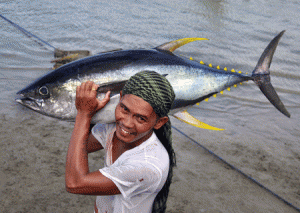
A 42-kilogramme yellowfin tuna (Thunnusalbacares) is the prized catch of this fisher from the Philippines. WWF, Philips and the Municipality of San Jose have partnered to illuminate the San Jose Port, a tuna landing site with solar-powered LED lights. (Gregg Yan / WWF-Philippines)
The carbon footprint of handline tuna, which promotes small-scale fishing and is already small due to its low overall environmental impact, will be further reduced by the use of renewable energy plus the use of energy-efficient LEDs. “The process of generating solar-powered energy is carbon-free. The shift to renewable energy solutions reduces fossil fuel dependency while encouraging the economic development of local industries,” declares WWF-Philippines Climate Change and Energy Program Head Atty. Angela Ibay.
Already have an active account? Log in here.
Continue reading with one of these options:
Continue reading with one of these options:
Premium + Digital Edition
Ad-free access
P 80 per month
(billed annually at P 960)
- Unlimited ad-free access to website articles
- Limited offer: Subscribe today and get digital edition access for free (accessible with up to 3 devices)
TRY FREE FOR 14 DAYS
See details
See details
If you have an active account, log in
here
.

